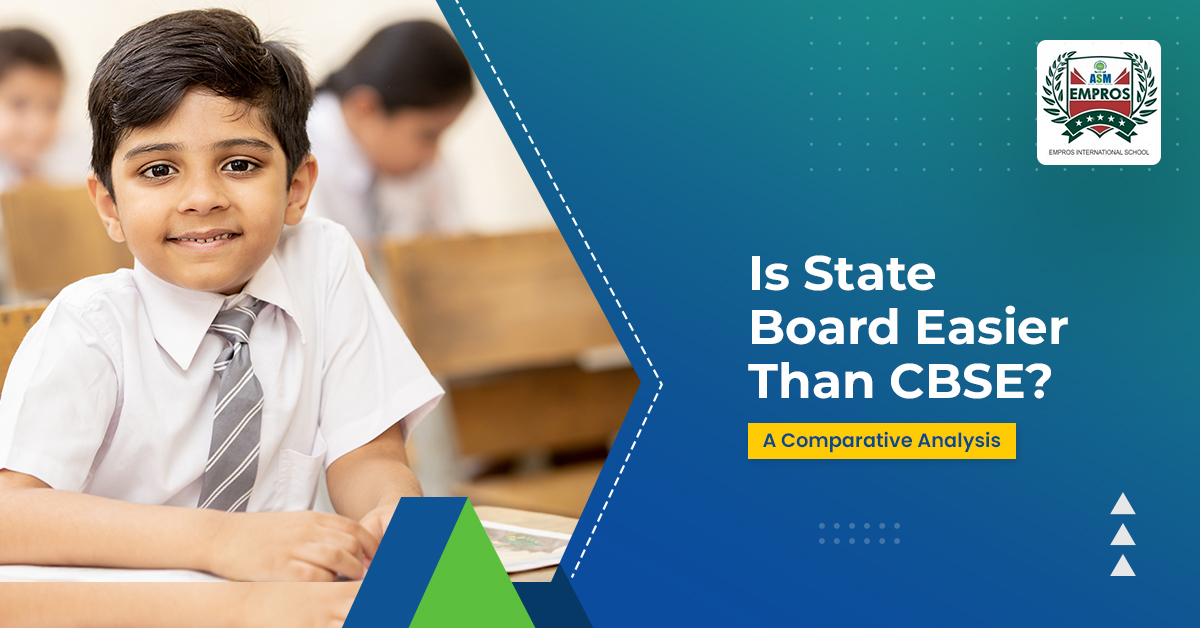Choosing the right educational board is a significant decision for students and parents alike. In India, two of the most common options are the Central Board of Secondary Education (CBSE) and the State Boards. While CBSE is widely recognized across the nation and internationally, each state in India has its own State Board with varying curriculums.
A frequent question that arises during this decision-making process is: “Is State Board easier than CBSE?” This blog explores both systems, compares them across various parameters, and provides a clear understanding of which might be the better option for students based on their goals and learning preferences.
What is State Board?
State Boards are educational bodies operated by the respective state governments in India. Each state has its own board responsible for designing the curriculum, managing schools, and conducting examinations within the state. As a result, the syllabus, textbooks, and teaching methods can vary significantly from one state to another.
While State Boards focus on local languages, history, and culture, the approach to learning and education standards is unique to each state. The diversity in curriculums often leads to the perception that State Board education may be more flexible or localized compared to CBSE, which follows a more uniform national approach.
Role of State Boards
The role of State Boards goes beyond conducting examinations. Here are some of the primary roles of State Boards:
- Designing the Curriculum: Each State Board sets its own curriculum, often incorporating regional content and state-specific subjects.
- Setting Exam Standards: State Boards create examination patterns that may differ from other boards, including varying difficulty levels.
- Affiliating Schools: State Boards affiliate and govern schools within the state, ensuring adherence to state-specific educational guidelines.
- Language Medium: In many states, State Boards allow students to choose their language of instruction, including the regional language.
- Cultural Integration: State Boards often integrate local culture, history, and geography into their curriculum, making the content relatable to the students.
What is CBSE?
The Central Board of Secondary Education (CBSE) is a national board governed by the Government of India. CBSE schools are spread across the country, and its curriculum is designed to be consistent for all students, regardless of geographic location. CBSE is known for its structured and streamlined syllabus, which aligns with national standards and prepares students for various competitive exams.
CBSE follows a concept-based learning approach, where understanding takes precedence over rote memorization. The curriculum is based on NCERT (National Council of Educational Research and Training) textbooks, which are used across the board to ensure consistency in education.
Role of CBSE
CBSE plays a crucial role in shaping education in India. Here are some key roles of the CBSE board:
- Designing a Uniform Curriculum: CBSE follows a national curriculum that ensures students across India receive the same quality of education.
- Affiliating Schools Nationwide: CBSE affiliates schools not only in India but also abroad, making it one of the most widespread educational boards.
- Conducting National-Level Exams: CBSE is responsible for conducting board exams for Class 10 and 12, which are critical milestones for students.
- Promoting Conceptual Learning: The board emphasizes conceptual clarity and application-based learning rather than focusing solely on memorization.
- Preparing Students for Competitive Exams: CBSE’s curriculum aligns closely with national-level competitive exams like JEE and NEET.
Related Blog: CBSE Board: Full form, Syllabus, Benefits, Schools in India
Key Differences Between State Board and CBSE
While both State Boards and CBSE aim to provide quality education, they differ significantly in various aspects:
1. Curriculum:
State Board: The curriculum is designed by each state and focuses on regional subjects and languages. It often incorporates local culture and history, providing a more localized educational experience.
CBSE: Follows a uniform national curriculum, largely based on NCERT textbooks, ensuring a standardized education across the country.
2. Syllabus Rigor:
State Board: The syllabus may be less demanding in terms of conceptual depth, as it varies by state and can focus on regional topics.
CBSE: Known for its comprehensive syllabus that emphasizes both theory and application, preparing students for competitive exams.
3. Exam Structure:
State Board: Examination patterns differ from state to state, often focusing on rote memorization and direct questions.
CBSE: The exam pattern is more standardized, with a mix of multiple-choice, short-answer, and application-based questions that test conceptual understanding.
4. Language of Instruction:
State Board: Allows regional languages as the primary medium of instruction, making it easier for students to learn in their native language.
CBSE: Primarily follows English and Hindi as the medium of instruction, providing a broader scope for higher education opportunities.
5. Focus Areas:
State Board: Emphasizes regional subjects and local content, which may limit exposure to broader national or global topics.
CBSE: Focuses on a wide range of subjects, including science, mathematics, and social studies, offering a well-rounded education.
Is State Board Easier Than CBSE?
There is a common perception that State Board is easier than CBSE. This perception stems from several factors:
- Regional Content: State Boards often include local topics and language, making it more relatable and easier for students to grasp.
- Rote Learning: State Board exams may rely more on rote memorization than conceptual understanding, which some students find easier.
- Less Competitive: Since State Boards are more regionally focused, they may not be as rigorous as CBSE, which aims to prepare students for national and international challenges.
While State Board might seem easier due to these factors, it is important to remember that “easier” is subjective and depends on the student’s learning style and academic goals.
Related Blog: CBSE or State Board: Which Is the Best Board?
Which is Better for Competitive Exams: State Board or CBSE?
Competitive exams such as JEE, NEET, and UPSC are designed with a national perspective in mind. These exams typically align closely with the CBSE syllabus, making it easier for CBSE students to perform well.
State Board or SCC Students in Competitive Exams:
- Additional Coaching: State Board students often require additional coaching to prepare for national-level exams due to differences in syllabus and teaching methods.
- Content Gaps: Since State Boards focus more on regional content, students may face gaps in understanding national-level subjects covered in competitive exams.
CBSE Students in Competitive Exams:
- Aligned Syllabus: CBSE’s syllabus is closely aligned with competitive exams like JEE and NEET, giving students an advantage in terms of familiarity with topics.
- Conceptual Focus: CBSE’s emphasis on conceptual learning helps students develop critical thinking skills necessary for competitive exams.
Future Opportunities: State Board vs. CBSE
The board a student chooses can influence their future academic and career opportunities. Here’s how the two compare:
Future Opportunities for State Board or SCC Students:
- Local College Admissions: State Board students may find it easier to get admission to state-run colleges, especially for courses with a regional focus.
- Regional Jobs: Graduates of State Boards may be better prepared for regional job markets, particularly in government or local industries.
- Language Preference: Students educated in regional languages may find opportunities in fields that require fluency in the local language.
Future Opportunities for CBSE Students:
- National and International Recognition: CBSE is widely recognized by national and international universities, making it easier for students to apply for higher education globally.
- Competitive Exams: CBSE students are often better prepared for national-level competitive exams due to the curriculum’s alignment with these exams.
- Broader Career Choices: A CBSE education equips students with skills that are applicable in a wide range of fields, including technology, medicine, and management.
Advantages and Disadvantages of State Board
Advantages of State Board:
- More focus on regional culture and language.
- Familiar content for local students.
- Less pressure compared to CBSE.
Disadvantages of State Board:
- Limited national or international recognition.
- Less focus on conceptual learning.
- May require additional coaching for competitive exams.
Advantages and Disadvantages of CBSE
Advantages of CBSE:
- National and international recognition.
- Strong foundation for competitive exams.
- Emphasizes conceptual learning.
Disadvantages of CBSE:
- More rigorous curriculum.
- High pressure due to competitive nature.
- Less regional or cultural content.
BrainPulses :
BrainPulses offers a gamified learning experience through the world’s best AI-integrated quizzing app, igniting curiosity, assessing wisdom, expanding knowledge, and building expertise to keep employees engaged and empowered.
FAQs about Is State Board Easier Than CBSE
Q1. Which board is more popular, State Board or CBSE?
CBSE is more popular on a national and international level, while State Boards are regionally popular within their respective states.
Q2. Do State Boards offer the same subjects as CBSE?
The core subjects are similar, but State Boards often include regional content and may have variations in subject offerings.
Q3. Which board is better for students who want to study abroad?
CBSE is generally better for students who want to study abroad as it is more widely recognized by international universities.
Q4. Is the syllabus of State Boards less demanding than CBSE?
Yes, the syllabus of State Boards is often perceived as less demanding, focusing more on rote learning and regional topics.
Q5. How does the exam pattern differ between State Board and CBSE?
State Board exams tend to be more straightforward and based on memorization, while CBSE exams focus on conceptual understanding and application.
Conclusion
In conclusion, whether State Board is easier than CBSE depends on the student’s individual learning style and future academic goals. State Boards may be easier in terms of exam patterns and localized content, but CBSE provides a broader, more competitive learning environment. Ultimately, the decision should be based on what aligns best with the student’s aspirations.
Experience Quality CBSE Education at ASM Empros International School
At ASM Empros International School, we believe in providing a comprehensive education that prepares students for the future. As a premier CBSE institution, we focus on conceptual learning, critical thinking, and overall development. Join us to experience world-class CBSE education that opens doors to global opportunities.

